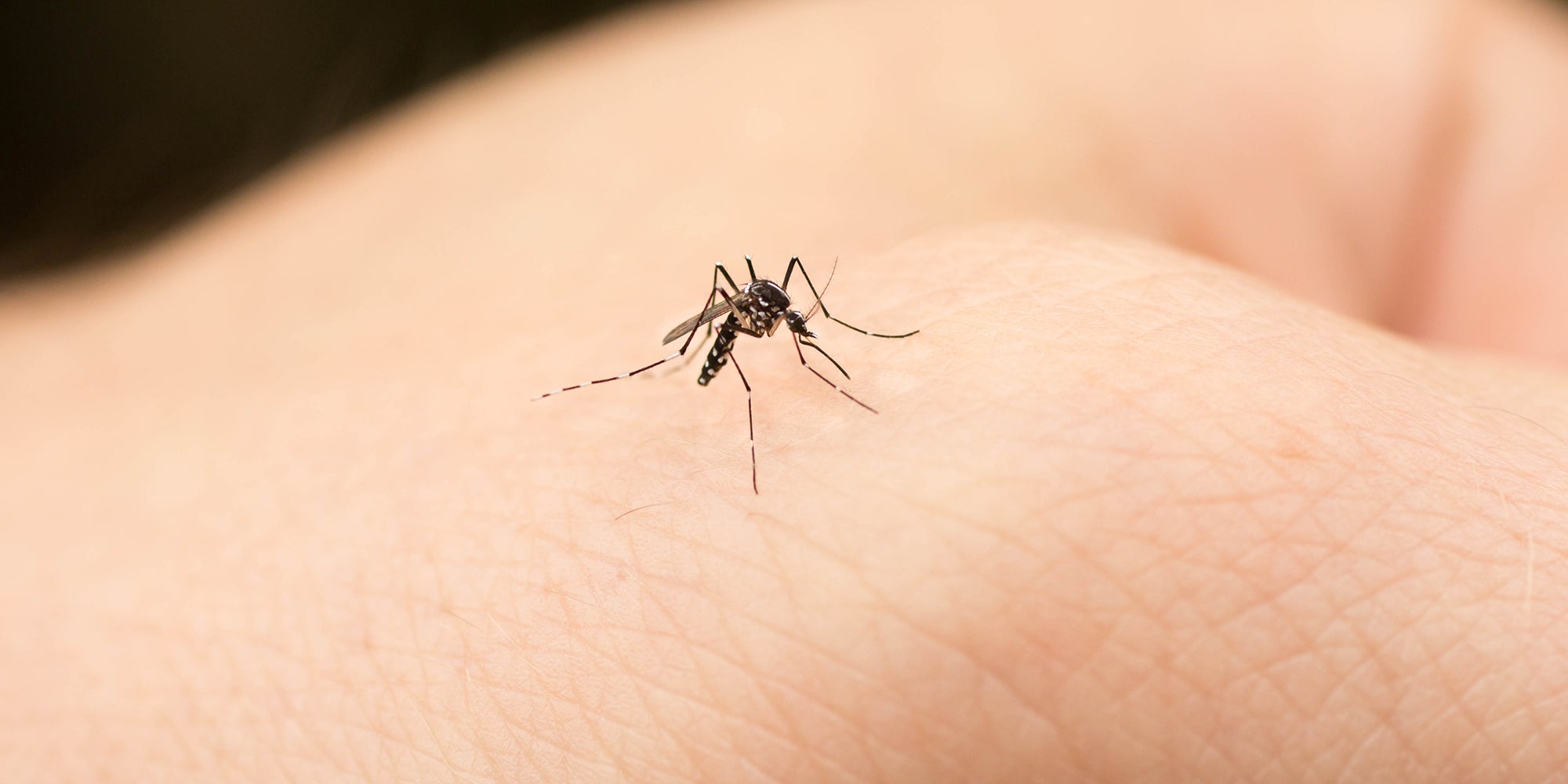 By Khalilah Babino, DO, Immediate Care Medicine
By Khalilah Babino, DO, Immediate Care Medicine
As the warm summer weather continues, so does our exposure to insects. This time of year we often see patients who have concerns about insect bites.
Of particular concern is the Aedes mosquito that can be infected with the Zika virus and transmit it to humans during a bite.
Initially, this particular disease was primarily limited to Africa, South Asia and Southeast Asia, but it has spread to the Eastern Pacific and then South America and now is well-established in much of the Caribbean, Central and South America.
At one time, all cases of Zika in the United States were among returning travelers. Miami reported the first cases of Zika transmitted within the United States, according to the Centers for Disease Control and Prevention, which is closely monitoring the virus.
The vast majority of people who are infected with the Zika virus will have no symptoms, while the remaining infections typically have only mild, flu-like symptoms such as:
- Body aches
- Fever
- Headache
- Joint pain
- Rash
- Red eyes
These symptoms typically clear up within a week with rest, fluids and over-the-counter medication.
However, pregnant women who are infected with Zika are at risk of transmitting the virus to their fetus.
This can cause serious birth defects such as microcephaly in which the newborn child’s head is abnormally small and that can be associated with serious medical problems and developmental delay.
Any pregnant woman or woman who is considering pregnancy needs to take extra precaution in preventing mosquito bites and should follow up with her healthcare provider if she has concerns related to Zika for any flu-like symptoms during pregnancy.
Although Florida has reported Zika-infected mosquitoes, in the rest of the United States, mosquito bites are typically more an itchy nuisance than a threat.
Other pests that “bug” us this time of year include ticks, fleas and chiggers.
Bees, wasps, yellow jackets and other stingers come out in larger numbers in late August and September. Yellow-jacket wasps become even more aggressive as late summer progresses.
September is a prime time for these wasps that are often mistaken for bees to interfere with outdoor festivals and picnics. Reactions to insect bites and stings (when the insect embeds its stinger into the skin) can range from very mild to very severe.
Fortunately, the majority of insect bites cause only mild symptoms, including local skin redness, swelling and irritation. Severe reactions typically appear quickly and may require immediate treatment.
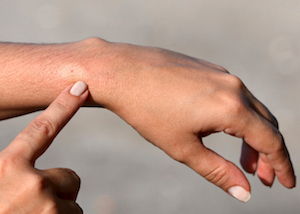
A wasp sting leaves a small mark when the reaction is mild. |
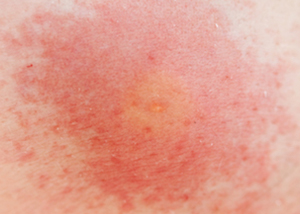
Redness is an allergic reaction to a wasp or bee sting or an indication of an infection. |
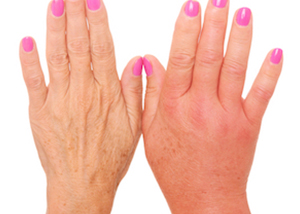
Swelling is an allergic reaction to a wasp or bee sting.
|
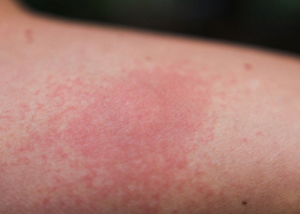
Redness from an infected mosquito bite expands around the bite. If the area develops red streaks, it may be a sign of a serious infection called cellulitis. |
Here’s what to do depending on the severity of the reaction to the bite or sting. Mild reactions can typically be treated without a trip to your primary care provider.
Most bites and stings respond well to conservative treatments such as:
- Washing the area of the bite with soap and warm water
- Applying cool compresses (such as a cold pack)
- Applying over-the-counter anti-itch creams or lotions such as Calamine
- Taking over-the-counter antihistamines such as Benadryl or Claritin if you have a lot of itching
-
Taking over-the-counter pain medicines such as Ibuprofen that relieve inflammation
(Consult your child’s doctor before giving medication for an insect bite or sting.)
If you suffer a more severe reaction, such as excessive swelling or irritation, you may require a short course of prescription oral steroids and/or anti-itch medication.
Some insect bites can also lead to a skin infection called cellulitis. Clues of infection may include insect bites that:
- Respond poorly to conservative measures
- Begin to spread or develop red streaks
- Become increasingly red, firm, painful, warm to touch and/or drain pus
- Cause fever, fatigue and body aches
Unfortunately, there are insect bites and stings that can cause a very severe and life-threatening reaction known as anaphylaxis. Symptoms may involve:
- Severe widespread rash and/or flushing of skin
- Swelling
- Difficulty breathing
- Vomiting
Anaphylaxis requires prompt and immediate medical treatment. While insect bites can be a big nuisance this time of year, there are some small steps we can all take to help prevent them. Some practical, everyday tips include:
- Wearing shoes, long-sleeved shirts and long pants tucked into socks when going outdoors (especially in wooded areas where ticks are more common)
- Wearing gloves when working outdoors
- Staying indoors at dawn and dusk when mosquitoes are more active
- Avoiding areas of standing water, which can serve as a breeding ground for mosquitoes
- Removing areas of standing water in your yard
- Keeping your pets healthy and flea-free
- Applying bug spray/insect repellent to skin and clothing
Repellants containing DEET last longer depending on the concentration; for children, do not use one that contains more than 30% DEET.
Khalilah Babino, DO, is an immediate care medicine physician at Loyola Medicine.
Dr. Babino earned her medical degree from the College of Osteopathic Medicine of the Pacific at Western University of Health Science. She completed her residency at California Hospital Medical Center at the University of Southern California in family medicine.
Book an appointment today to see any of Loyola Medicine's expert primary care or specialty physicians by self-scheduling an in-person or virtual appointment using myLoyola.

